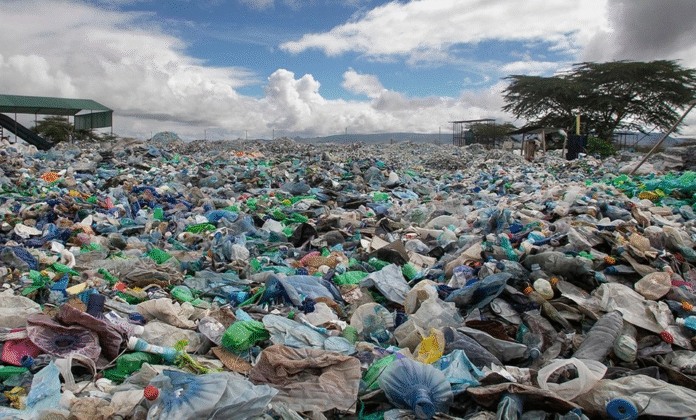Illustrative Image: Comparative Study Reveals How EU and Africa Tackle Plastic Pollution Through Waste Management Policies
Image Source & Credit: TONY KARUMBA/AFP via Getty Images
Ownership and Usage Policy
A recent study by Izuchukwu et al. (2025) titled “Assessing the Effectiveness of Waste Management Policies in Reducing Plastic Pollution: A Case Study of the EU and Africa” published in the American Journal of Social and Humanitarian Research, reveals that waste management policies play a crucial role in reducing plastic pollution, but their effectiveness varies significantly between the European Union (EU) and Africa.
“
Waste management policies significantly reduce plastic pollution, with greater effectiveness in the EU than in Africa.– Izuchukwu et al. 2025
The study examines how different waste management policies impact plastic pollution in the European Union (EU) and Africa. The authors highlight the environmental threats posed by plastic pollution, particularly to marine ecosystems, biodiversity, and human health. The research compares key policy frameworks, regulatory measures, and implementation strategies in both regions, analyzing their effectiveness in reducing plastic waste. The EU has implemented stringent regulations such as the Single-Use Plastics Directive, Extended Producer Responsibility (EPR) schemes, and Circular Economy Action Plans, which have led to measurable reductions in plastic waste and increased recycling rates. In contrast, Africa faces challenges like inadequate infrastructure, weak enforcement mechanisms, and limited financial resources. However, promising initiatives such as plastic bag bans, community-driven recycling programs, and international partnerships have emerged in several African countries. The study identifies critical factors influencing waste management efficiency, including policy enforcement, stakeholder collaboration, and financial investment.
How the Study was Conducted
The authors focused on examining the policy frameworks, regulatory mechanisms, and implementation strategies in both regions to assess their overall impact on reducing plastic waste. The research employed a mixed-methods approach, combining primary and secondary data collection. Sources included government reports, publications from environmental agencies, and peer-reviewed academic research. Additionally, interviews were conducted with key stakeholders such as policymakers, waste management experts, and environmental activists to gather qualitative insights into the successes and shortcomings of existing policies.
In the EU, policies such as the Single-Use Plastics Directive, Extended Producer Responsibility (EPR) schemes, and the Circular Economy Action Plan were analyzed. In contrast, Africa’s approach was characterized by plastic bag bans, community-led recycling initiatives, and strategic international partnerships. The comparative analysis centered on policy enforcement, stakeholder collaboration, and financial investment in waste management infrastructure. To assess the outcomes, the study measured indicators such as plastic waste reduction rates, recycling efficiency, and levels of public engagement. Case studies from Germany, Sweden, Rwanda, and Kenya served as illustrative examples of successful policy implementation and innovation in plastic waste management.
What the Authors Found
The authors found that while both regions have made significant progress, several challenges persist. In Africa, limited infrastructure and financial constraints often hinder effective policy enforcement. In the EU, although policies are generally well-funded and systematically enforced, disparities in implementation across member states remain a concern. The study also posits that the EU has implemented strict regulations, such as the Single-Use Plastics Directive and Extended Producer Responsibility (EPR) schemes, leading to higher recycling rates and reduced plastic waste. Countries like Germany and Sweden have achieved over 60% plastic recycling rates, thanks to advanced waste collection systems and public participation.
Why is this important
Environmental Protection: Plastic pollution damages ecosystems, harms wildlife, and contaminates oceans. Waste management policies—such as plastic bans and recycling programs—are essential to mitigating these environmental threats.
Human Health & Safety: Microplastics have infiltrated food, water, and even human blood, posing serious health risks. Effective waste policies help limit human exposure to these contaminants.
Economic & Social Impact: Inefficient waste management results in losses for sectors like tourism, agriculture, and fishing. Conversely, investing in sustainable waste practices stimulates job creation and supports economic growth.
Global Cooperation: Plastic pollution is a transnational issue requiring international collaboration. Coordinated efforts between regions can lead to more effective solutions.
Innovation & Sustainable Alternatives: Advancing biodegradable materials and improving recycling technologies are critical steps toward reducing plastic dependency and achieving long-term sustainability.
What the Authors Recommended
- Governments should enhance the monitoring and enforcement of plastic bans and recycling regulations. Establishing clear penalties for non-compliance is essential to ensure accountability and drive adherence to waste management laws.
- Increased funding is needed for waste management infrastructure, especially in developing regions. Public-private partnerships should be encouraged to support large-scale recycling and waste reduction initiatives.
- Invest in research and development of biodegradable materials, advanced recycling technologies, and sustainable packaging solutions. Innovation is key to reducing environmental impact and transitioning to a circular economy.
- Strengthen international collaboration by sharing best practices, aligning regulatory frameworks, and developing harmonized waste management policies to address global plastic pollution challenges collectively.
- Implement targeted education and awareness campaigns to encourage community participation in reducing plastic waste. Informed and engaged citizens are critical to the success of sustainable waste management strategies.
In conclusion, the study by Izuchukwu et al. underscores the pivotal role of effective waste management policies in combating plastic pollution while highlighting the stark contrasts between the European Union and Africa. Despite differing challenges and capacities, both regions demonstrate that progress is possible through strong policy frameworks, stakeholder collaboration, and sustained investment. By learning from each other’s successes and shortcomings and fostering global cooperation, the world can move closer to reducing plastic waste and achieving long-term environmental sustainability.
















 The African Research (AR) Index is a comprehensive scholarly directory and database focused explicitly on journal publishers that publish and disseminate African research.
The African Research (AR) Index is a comprehensive scholarly directory and database focused explicitly on journal publishers that publish and disseminate African research.

